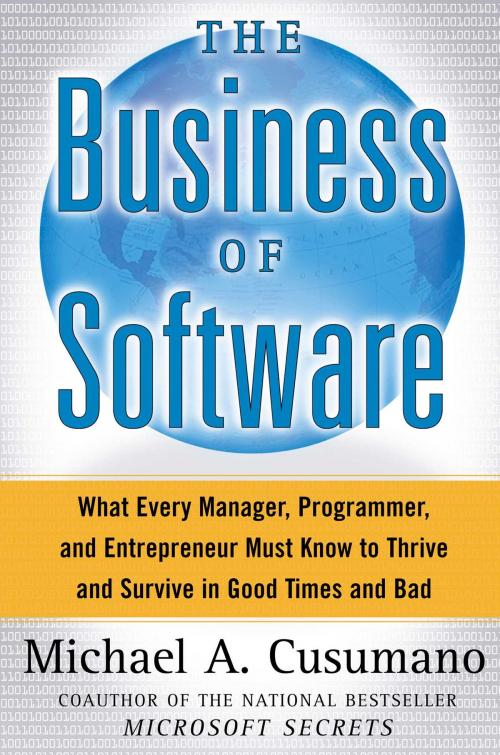The Business of Software
What Every Manager, Programmer, and Entrepreneur Must Know to Thrive and Survive in Good Times and Bad
Business & Finance, Career Planning & Job Hunting, Entrepreneurship, Entrepreneurship & Small Business| Author: | Michael A. Cusumano | ISBN: | 9780743266635 |
| Publisher: | Free Press | Publication: | March 15, 2004 |
| Imprint: | Free Press | Language: | English |
| Author: | Michael A. Cusumano |
| ISBN: | 9780743266635 |
| Publisher: | Free Press |
| Publication: | March 15, 2004 |
| Imprint: | Free Press |
| Language: | English |
The world's leading expert on the global software industry and coauthor of the bestseller Microsoft Secrets reveals the inner workings of software giants like IBM, Microsoft, and Netscape and shows what it takes to create, develop, and manage a successful company -- in good times and bad -- in the most fiercely competitive business in the world.
In the $600 billion software industry it is the business, not the technology, that determines success or failure. This fact -- one that thousands of once glamorous start-ups have unhappily discovered for themselves -- is the well-documented conclusion of this enormously readable and revealing new book by Michael Cusumano, based on nearly twenty years of research and consulting with software producers around the world.
Cusumano builds on dozens of personal experiences and case studies to show how issues of strategy and organization are irrevocably linked with those of managing the technology and demonstrates that a thorough understanding of these issues is vital to success. At the heart of the book Cusumano poses seven questions that underpin a three-pronged management framework. He argues that companies must adopt one of three basic business models: become a products company at one end of the strategic spectrum, a services company at the other end, or a hybrid solutions company in between. The author describes the characteristics of the different models, evaluates their strengths and weaknesses, and shows how each is more or less appropriate for different stages in the evolution of a business as well as in good versus bad economic times. Readers will also find invaluable Cusumano's treatment of software development issues ranging from architecture and teams to project management and testing, as well as two chapters devoted to what it takes to create a successful software start-up. Highlights include eight fundamental guidelines for evaluating potential software winners and Cusumano's probing analysis, based on firsthand knowledge, of ten start-ups that have met with varying degrees of success.
The Business of Software is timely essential reading for managers, programmers, entrepreneurs, and others who follow the global software industry.
The world's leading expert on the global software industry and coauthor of the bestseller Microsoft Secrets reveals the inner workings of software giants like IBM, Microsoft, and Netscape and shows what it takes to create, develop, and manage a successful company -- in good times and bad -- in the most fiercely competitive business in the world.
In the $600 billion software industry it is the business, not the technology, that determines success or failure. This fact -- one that thousands of once glamorous start-ups have unhappily discovered for themselves -- is the well-documented conclusion of this enormously readable and revealing new book by Michael Cusumano, based on nearly twenty years of research and consulting with software producers around the world.
Cusumano builds on dozens of personal experiences and case studies to show how issues of strategy and organization are irrevocably linked with those of managing the technology and demonstrates that a thorough understanding of these issues is vital to success. At the heart of the book Cusumano poses seven questions that underpin a three-pronged management framework. He argues that companies must adopt one of three basic business models: become a products company at one end of the strategic spectrum, a services company at the other end, or a hybrid solutions company in between. The author describes the characteristics of the different models, evaluates their strengths and weaknesses, and shows how each is more or less appropriate for different stages in the evolution of a business as well as in good versus bad economic times. Readers will also find invaluable Cusumano's treatment of software development issues ranging from architecture and teams to project management and testing, as well as two chapters devoted to what it takes to create a successful software start-up. Highlights include eight fundamental guidelines for evaluating potential software winners and Cusumano's probing analysis, based on firsthand knowledge, of ten start-ups that have met with varying degrees of success.
The Business of Software is timely essential reading for managers, programmers, entrepreneurs, and others who follow the global software industry.















